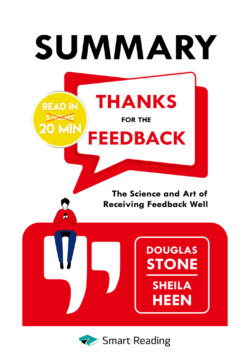Summary: Thanks for the Feedback. The Science and Art of Receiving Feedback Well. Douglas Stone, Sheila Heen

Реклама. ООО «ЛитРес», ИНН: 7719571260.
Оглавление
Smart Reading. Summary: Thanks for the Feedback. The Science and Art of Receiving Feedback Well. Douglas Stone, Sheila Heen
The Feedback Test
What obstructs feedback?
Truth Triggers
What should be done?
Relationship Triggers
Two Main Problems with Relationship Triggers
How To Frame a Conversation
Identity Triggers
How to Change Distorted Identity Triggers
When It Is Better to Opt Out of feedback
How to Receive Feedback: Before, During, and After the Conversation
Before the Conversation
During the Conversation
After the Conversation
Five Ways to Maximize the Value of Feedback in the Company
Отрывок из книги
We live in the world of constant feedback, in which we are regularly evaluated, criticized, receive advice and recommendations. As schoolchildren and students, we submitted thousands of assignments that were graded and took endless exams. As adults, we must participate in interviews where our every word is judged, listen to criticism from management and undergo performance evaluations at work. And how should we interpret "you scream all the time" or "you never understand me" that we face in our personal lives?
Being the recipient of feedback becomes a serious test, just as it is to give feedback. Even if expressed to people with the best of intentions, criticism comes across as aggressive, comments appear biased or inappropriate, and assessments seem erroneous. We neither want to communicate negative information nor do we want to receive it. And this is why we are afraid of feedback and try to avoid it. Our need for love and acceptance conflicts with our desire to learn and improve. But practice shows that people who are open to feedback are more effective, adapt to new roles more easily and get more job satisfaction, while an inability to accept criticism leads to senseless conflicts and tension.
.....
Identity triggers. It seems to us that criticism threatens our system of self-perception. In an attempt to preserve the "psychological me", we refuse to discuss our weaknesses. ("Well, of course, I always mess things up.")
All of these reactions are natural but interfere with constructive feedback. Next, the authors will talk about how to counteract them and how to hold conversations regarding feedback.
.....